By Anneke Quinn-de Jong
Hi everyone,
For those of you who attended my presentation ‘The Mutation of Research’ at ESOMAR Congress 2017, here is the unfolded draft piece of paper that was meant to morph into my final ‘killer slide’…
I am heartened and excited by the fact that so many of you are passionate about redefining the role / identity of the modern researcher in a new business reality.
Please see this slide as a thought starter, and if you have any thoughts, comments, builds, please comment below as I would love to keep the dialogue alive!
Many thanks,
Anneke
Hooray, we have achieved it! Research and consumer centricity have firmly established themselves as core to the innovation process. With the rise of a new and provocative innovation mind-set that works towards soft launches rather than big bang launches, consumer feedback has become an essential part of the pivoting process. Propositions are being developed around consumer needs rather than being an exercise of pushing boxes to the consumer. This is a development that can only be applauded.
But wait a minute? Who is talking to the consumer over there? I don’t think it is the researcher… No, it’s the technical engineer, and over there it is the intern, and isn’t that the marketer talking to his mum over there about one of our new ideas?
Great! Isn’t that what we wanted, that everyone gets closer to the consumer?
A Parallel World
The concepts popularized by Eric Ries in The Lean Startup have become part of everyday business lingo and have inspired a broad spectrum of people to take on a new approach to business. An approach that is all about learning what your customers really want by testing your vision continuously, adapting and adjusting before it is too late. It is an approach in which multi-disciplinary teams are encouraged to lead and conduct experiments to gain consumer learning. The upside of this way of working is that it wholeheartedly embraces consumer-centricity across the board.
On the face of it, this is great news for the consumer insight industry, but, has anyone noticed that there is a parallel world going on? One in which non-researchers are reinventing research?
Over the course of the last year I became aware of this parallel world on a number of occasions…
On one occasion, a young marketer talked enthusiastically about the proposition development she was part of. She explained how the team had organised a round of consumer interviews to feed into the iterative learning process. When asked if she liked doing consumer research, she looked blankly and said; ‘We didn’t do any consumer research on this project, we only did experiments…’
In another situation, a digital coach was talking about the experiments he was doing for a particular project. The experiments were mostly digital and when asked how he did this with groups of people who are not necessarily on facebook, or for B2B, he said, ‘oh, we have some really cool other experiment methods’. When asked what these type of experiments were, he explained; ‘in some experiments we just talk to people f2f and in other experiments we just get a group of people together to discuss and idea…’
There are many more examples like the above. The discomforting factor here is not the fact that these people are talking to consumers, there is absolutely nothing wrong with that, the point is that doing so is no longer seen as requiring any skill; it is something anyone can do.
Out of control?
I am all for embracing consumer closeness across the board and the new innovation mind-set has been tremendously positive in bringing the consumer to the heart of proposition development. I am also truly excited about the new and different ways that help us gain knowledge, feedback and insight from and about our consumers. But, there has been one thing that has worried me about the developments over the last few years and that is, that somewhere in the process people have missed the fact that research is an actual discipline which requires certain skills, rigor and integrity.
If I hear people say that they have a winning concept based on n=3, or if I overhear someone conducting an interview saying ‘this really is a great idea. Isn’t it?’ or if an A/B test is done with 5 variables, I do get worried… I do not get worried because I am precious about my skills and expertise, I get worried because proposition development is more and more based on consumer learning that is of low quality. And that can’t be good for business development…
To my delight I found that cartoonist Tom Fishburne has accurately drawn on these types of examples…
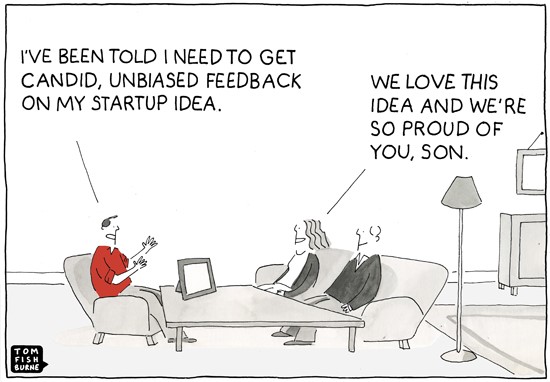
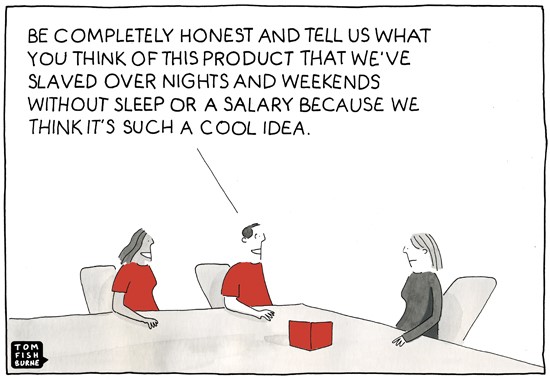
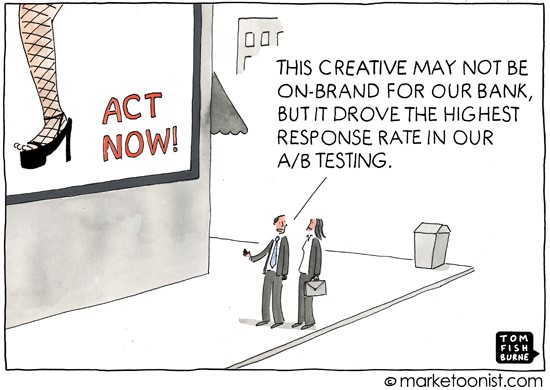
Of course I am focusing on the more extreme examples, but I am convinced that the new innovation mindset has generated a set of ‘research behaviours’ that the research community is no longer controlling. Where our industry has fought a battle to safeguard objectivity, quality and integrity, these very elements are now often ignored in this parallel world…
The Death of Expertise
When I started working in this industry, the big challenge was all about bringing consumer insight to the boardroom table, to become a business partner. But I believe that we have entered a different era for the research industry, one in which groups of people don’t even know about or acknowledge its existence anymore.
I’d like to draw a parallel with Tom Nichols’s notion of ‘The Death of Expertise’;
‘Today, everyone knows everything: with only a quick trip through WebMD or Wikipedia, average citizens believe themselves to be on equal intellectual footing with doctors and diplomats.’
In his book that was published earlier this year, the former aide in the U.S. Senate voices his immense worry about the growing rejection of experts;
‘I fear we are witnessing the “death of expertise”: a Google-fuelled, Wikipedia-based, blog-sodden collapse of any division between professionals and laymen, students and teachers, knowers and wonderers – in other words, between those of any achievement in an area and those with none at all.’
Back in June 2016, the declared Brexit architect Michael Gove refused to name any economists who back Britain’s exit from the European Union, saying that “people in this country have had enough of experts”. Tom Nichols has further elevated this phenomena of ‘expert rejection’ and wrote his book as a warning about the stability and survival of modern democracy in the Information Age. It goes too far to apply his whole thinking to our industry, but I do believe that this phenomena has its bearing on many experts, including those of the research industry.
We can have hundreds of Thought leaders, Tech adopters, Navigators and Pioneers amidst ourselves, but if research continues to happen in a parallel world, all our collective brains don’t matter…. If part of the world doesn’t even know or acknowledges the existence of the industry and its expertise, is it not time to ask ourselves if this is the death of Market Research expertise??
Bigger than us
It is a discussion that is bigger than us and also going on in other industries, perhaps most close to our industry is that of Investigative Journalism. It is often noted that Journalism faces a crisis worldwide – that it might be entering a new Dark Age.
To dwell on this a little bit; what sets the work of an Investigative Journalist apart is its adversarial engagement, the refusal to take things at face value, the relentless willingness to dig deeper and deeper until the truth is exposed. Yet, we live in a day and age where almost anyone can use the worldwide web to be a media outlet, so how will we differentiate between truth, myth and lies? How will we be able to differentiate between facts and alternative facts? Just like anyone can be a researcher, anyone can be a journalist these days…
Whilst one development is that of non-journalists creating news and ‘truths’, we also see professional journalists struggling with the growing demands of their ‘clients’. In the field of journalism accuracy and speed are extremely important. Being unbiased and objective are also viable qualities of a good journalist. Yet the driving force behind a lot of stories is the need to get the most truthful information in a timely manner. But sometimes the mounting pressure and stress of trying to get a good story and meet deadlines can cause ethical issues.
And this is exactly what is happening in the Research Industry; on the one hand we see many non-researchers taking on a DIY approach (I quote; “We’re doing some experiments, it’s fabulous, instead of spending lots of money and time on focus groups for a new product for the Chinese market, we just talk to a few colleagues, it is so interesting!”) and on the other hand we see a mounting pressure on the research industry to become quicker, more automated and less expensive. Which in turn might lead to questions of integrity….
It is only fair at this point to use another cartoon of Tom Fishburne to express how some people view the market research industry…
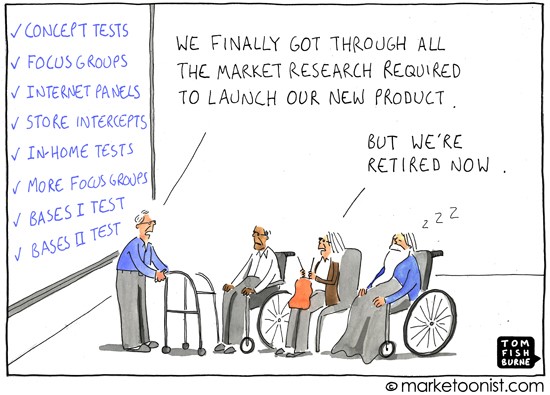
The future of the Market Research industry
In this context I hear a lot of voices and calls from within the market research industry to change; to say goodbye to ‘traditional’ market research and to embrace new and emerging analytical tools, to effectively mine data from multiple sources.
The good news is the seemingly endless possibilities that new technologies bring in our ability to understand and predict human behavior. It is amazing to see how the market research industry is applying developments in behavioural science, neuro science, data mining and the like to understand our consumer better.
Another piece of good news for our industry is that there’s no shortage of researchable data. Quite the contrary, there’s more than ever. It’s just that market researchers are no longer the exclusive collector; DIY research is happening all around us, causing a mutation of research quality and integrity.
And how exactly are we going to deal with this?
This is something I want to pose to the readers of this article: if everyone starts doing research / experiments, do we just ignore this and continue with our daily activities as normal? Or will we stand up and become educators of ‘good research’ (as per Tom Nichols; do the experts have an obligation to educate / help)? Or will we re-invent ourselves as ‘experimenters’? Or, thinking further ahead, will we be split between Neuro scientists and Big data analysts?
And last, one that is close to my heart; how can we maximise the opportunities this new consumer centricity brings – making sure that it contributes to innovation in the right way – without being the person who creates obstacles all the time? Without being seen as the police(wo)man? Without being seen as difficult and old-fashioned?
In my presentation at Congress (10-13 September, Amsterdam) I will share some examples on how we approach this within Philips, but in the run up of this, I would love to hear YOUR thoughts on it…
Anneke Quinn-de Jong, Philips International, Netherlands
Sources:
- Tom Nichols – The Death of Expertise
- Erik Ries – The Lean Startup
- Tom Fishburne – marketoonist.com
- https://www.counterpunch.org/2014/08/18/the-crisis-in-investigative-journalism/
- http://wvuinvestigativejournalism.com/2017/04/12/to-fabricate-or-not-to-fabricate-a-journalistic-struggle/
- https://www.theguardian.com/media/2017/apr/15/journalism-faces-a-crisis-worldwide-we-might-be-entering-a-new-dark-age
- https://www.forbes.com/sites/groupthink/2014/04/28/five-pitfalls-of-running-lean-startup-experiments/#517922346296


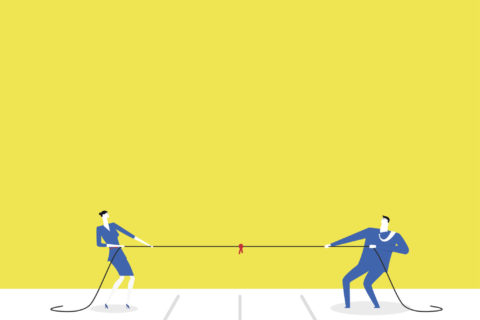
1 comment
Thank you for writing this! This echoes something I have felt over the last few years – especially after a client told me that one could pretty much just Google everything to know how to do research. I don’t doubt that is true, but I could google how to do a heart transplant too! I’ve also wondered if this trend will do more harm than good or elevate the profession it user centricity overall. Time will tell.